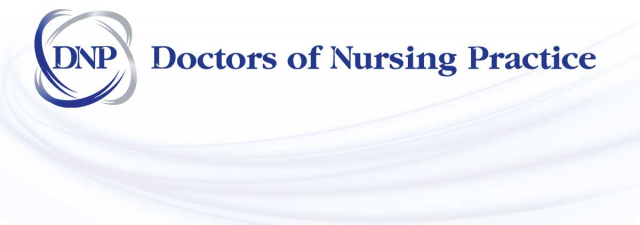-
Doctors of Nursing Practice, Inc. wrote a new post 2 years, 5 months ago
Beyond Band Aids: An Introduction to Comprehensive Wound ManagementWe proudly share an informative article from the University of Nevada Las Vegas. CLICK HERE to see more. Thoughts? Insights to share?
-
Doctors of Nursing Practice, Inc. wrote a new post 2 years, 5 months ago
We proudly share an article from the University of Nevada Las Vegas. CLICK HERE to see more.
Thoughts? Insights to share?
-
Doctors of Nursing Practice, Inc. wrote a new post 2 years, 6 months ago
Synchronous Telehealth Fatigue Among Healthcare Providers SurveyIf you are a nurse practitioner currently utilizing telehealth to deliver care to patients, I am inviting you to participate in this […]
-
Doctors of Nursing Practice, Inc. started the topic The History of Racism in Nursing in the forum Commission's Foundational Report on Racism in Nursing 2 years, 7 months ago
This report centers the experiences of nurses of color in U.S. history and how structural and systemic racism have hindered access to educational and professional opportunities as well as institutional power. The report also reviews some of the ways in which these nurses resisted, challenged, and achieved within the structures of…[Read more]
-
Doctors of Nursing Practice, Inc. changed their profile picture 2 years, 8 months ago
-
Doctors of Nursing Practice, Inc. wrote a new post 3 years ago
“U.S. News & World Report ranking of NPs as the nation’s top health care job demonstrates the strength of the profession in serving patients and communities and meeting the skyrocketing demand for high […]
-
View this article published by the AANP at THIS LINK.
-
-
Doctors of Nursing Practice, Inc. and
Tamara McGuire are now friends 3 years ago
-
Doctors of Nursing Practice, Inc. wrote a new post 3 years, 1 month ago
Here’s another important article shared by the AACN in their NEWS WATCH newsletter published 12/8/2021.
See the full-text article HERE.
-
Doctors of Nursing Practice, Inc. wrote a new post 3 years, 1 month ago
Variations in nursing baccalaureate education and 30-day inpatient surgical mortalityThis article was shared by the American Association of Colleges of Nursing in their NEWSWATCH newsletter published 12/8/2021. See the full text article HERE.
-
Doctors of Nursing Practice, Inc. wrote a new post 3 years, 2 months ago
Strategies to move entry-level NP education to the DNP degree by 2025This article is important for all DNP prepared graduates and faculty. We are proud to see the list of authors as they have been a big […]
-
Academia has always been at the forefront of not just advanced nursing practice, but nursing science as a whole. Some hospitals participate in the pursuit to reach Magnet Status- which is a status that indicates that nursing staff provide initiatives to create change within the hospital. To achieve Magnet status, nursing staff are required to have a BSN in nursing to qualify, providing that nursing staff have the education to participate in the changes needed to create a better work environment, for the current, and future of the hospital. This initiative relates to advanced practice nurses obtaining the DNP degree versus the MSN. It prepares the advanced practice practitioner to be a change agent in an ever-changing field of nursing. Transformational leadership has been described as has been described as a “style of leadership in which the leader identifies the needed change, creates vision to guide change through inspiration, and executes the change with the commitment of the members of the group” (Marshall, 2011, p. 3). DNP prepared nurses may find this style of leadership powerful because they may have opportunities to identify areas that need change by working alongside their colleagues (Chism, 2019). Having advance practice nurses obtain a DNP versus a MSN degree affords the practitioner to be the change agent to create a brighter future for nursing.
Chism, L.A. (2019) The Doctor of Nursing Practice: A Guidebook for Role Development and Professional Issues (4the ed). Burlington, MA: Jones & Bartlett Learning. ISBN 13: 978-1284141856.
-
We just covered this issue of how DNP graduates can fill the nursing faculty gap in my advanced role and collaboration class. After reading this article, I agree with the issue of making a doctorate in nursing, the main entry level in nursing advanced practice.
The roles of Nurse practitioners(NP) have increased in the past years, and it is advisable to attain a doctorate so that more improved care based on evidence-based practices is provided. DNP graduates can use their knowledge, highest education, expertise, and background to fill all the complicated roles of the increasing demand in advanced nursing care. DNP graduates are qualified to help decrease this gap due to the knowledge and skills we have in research. Research is vital in furthering nursing and advanced science inquiry. A doctorate graduate is qualified, and I agree to educate all the NP to the doctorate level. It will be challenging to convince all NP to attain more education by 2025; however, this will be an outstanding achievement in the nursing community. Transitioning the current working nurse practitioners to a DNP entry level can be done by working collaboratively with states, national educational institutes, and health care systems. Financial resources can also help boost NP to attain their degrees. More faculties are needed that can teach NP to DNP. However, there is a shortage of nursing educators due to less pay and a large workload. Financial incentives should be provided to entice more nurses to enter the education field to help educate more nurses.-
Thank you for sharing your insights, Rehema. One issue that this article doesn’t discuss is licensure. Advanced practice licensure is different for every state, which complicates the idea that doctoral preparation should be the entry degree for practice. This is called the LACE initiative (Licensure, Accreditation, Certification, and Evaluation). Have you heard of this?
-
With respect to the complicating factors relating to state-controlled licensure, it would be interesting to find out how the other health professions who require doctoral prep for ENTRY into practice have handled this. This now includes clinical Psychology (PsyD),Speech Path, Audiology (Aud D), Occupational Therapy (OTD), Physical Therapy (DPT), and Pharmacology (PharmD).
-
You ask a good question, Jean. I also wonder what other professions have in terms of licensure (state-by-state, etc.) I suspect each state Board of (fill in the blank) has their own rules like we do in nursing. If anyone can share more, please do.
-
-
-
-
-
Doctors of Nursing Practice, Inc. wrote a new post 3 years, 2 months ago
A Billion-Dollar DonationThe attached article highlights the contributions of peer-reviewers. The numbers are surprising. Thanks to Dr. Roger Watson from the […]
-
Doctors of Nursing Practice, Inc. wrote a new post 3 years, 2 months ago
Articles on Diversity, Equity, and InclusionTo anyone and everyone that has an interest in learning more about Diversity, Equity, and Inclusion (DEI) please see this list provided […]
-
Doctors of Nursing Practice, Inc. changed their profile picture 3 years, 2 months ago
-
Doctors of Nursing Practice, Inc. and
 JohnRich R Levine are now friends 3 years, 5 months ago
JohnRich R Levine are now friends 3 years, 5 months ago -
Doctors of Nursing Practice, Inc. and
 Michael Buckner are now friends 3 years, 7 months ago
Michael Buckner are now friends 3 years, 7 months ago -
Doctors of Nursing Practice, Inc. wrote a new post 3 years, 8 months ago
How DNPs are Steering the Future of NursingWhether you are focused on being a clinician, an educator, in shaping health policies—or a combination of these—earning a Doctor of Nur […]
-
Hi,
Thank you for your post. You bring up a point that is worth the conversation. You explained your notion that the DNP degree is paving the way for nursing and its outlook on success for lucrativeness. This reminds me of how far the nursing career has come. The original nurse who served as the first line to those fighting in wars has evolved, been reinvented, and reimagined to become a multifaceted profession with hundreds of specialties, and subspecialties with advanced nursing practice taking over primary care. Health as a human right is fundamental to the concept of access to and indeed equity in health care. Universal access to health care is an imagined concept in the US. While past presidential cabinets have pushed the initiative for universal healthcare, the quality is lacking and often still falls short for the community in need. As nursing has evolved into Doctors of the practice with practice-focused licenses, we have a larger quantity of mid-level providers who can deliver healthcare to those communities in need of change, education, and a chance to be helped. Along with the rise of the modern hospital, we need a rise in new and modern healthcare delivery. With this profound technological change, especially in clinical practice and treatment of so many conditions, we need APNs to bridge that gap. -
Great response and thoughts, Arionn. Thank you for sharing. What you wrote is inspiring and motivating. Again, thank you for sharing these insights.
-
-
Doctors of Nursing Practice, Inc. and
grmahoney are now friends 3 years, 8 months ago
-
Doctors of Nursing Practice, Inc. and
allthompson are now friends 3 years, 8 months ago
-
Doctors of Nursing Practice, Inc. and
JeanDelice79 are now friends 3 years, 8 months ago
-
Doctors of Nursing Practice, Inc. and
Laura Reed are now friends 3 years, 9 months ago
- Load More









Skin breakdown and wound development are one of the issues that are affecting the cost of health care. The hospital is not reimbursed for the treatment of hospital-acquired wounds. Hospitals are losing much money due to wounds, resources that could be used to improve care in other areas. Wounds can develop due to long hours of staying in one position, poor nutrition, and disease process, and we need to prevent them from developing. Turning patients every 2 hours and as needed can help prevent wound development. Assessing the skin daily, padding bonny prominences, and good nutrition can help prevent wounds from developing. However, when wounds develop, we need to learn how to care for them. This article has presented a fascinating way to treat and care for wounds. The author Kathleen states that assessing the patient, their medications, nutrition, hydration, psychosocial, and the environment is essential for proper wound healing. Assessing the etiology of the wound can help us develop treatment plans using various technologies to help faster-wound healing. For example, my employment organization asks us to assess all bonny prominences at admission using thermal camera technology. This thermal sensing camera technology can provide data on the status of the skin even before the wound develops by assessing and comparing the temperature of healthy skin and that of vulnerable skin. This data helps us to identify skin at risk for developing a wound 72 hours before it breaks down. We take thermal pictures of heels and sacrum at each admission and primarily use the thermal data difference to correlate with the breakdown. Using this data, my institution is unreliable in case a wound develops after admission because there was damage already to the skin even though it was not visible at the moment. Deep tissue injuries always do not show the depth of the wound until after the skin breaks. Thorough assessment and teaching nurses how to treat these wounds and assess skin is essential.